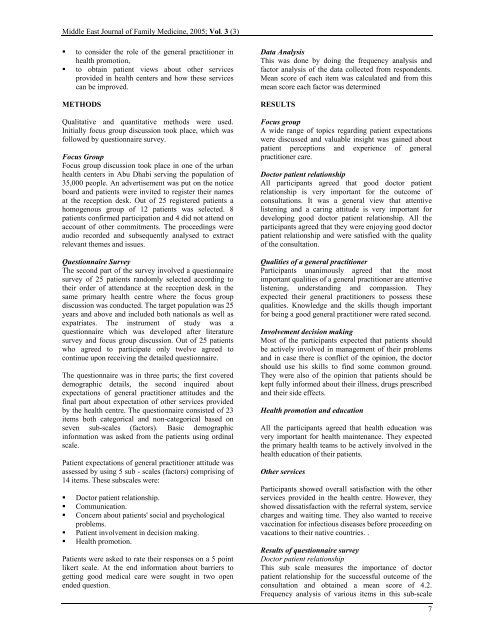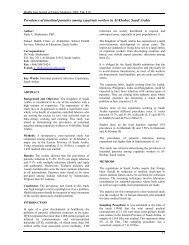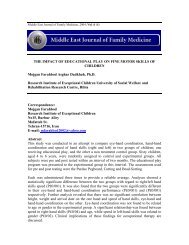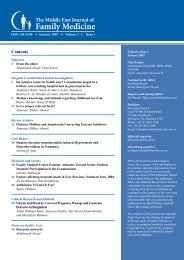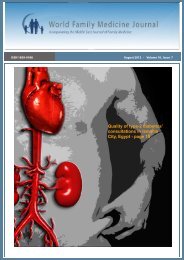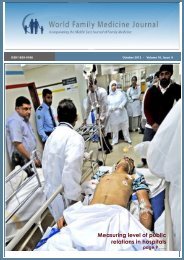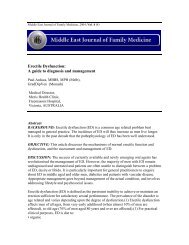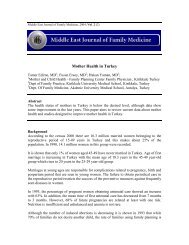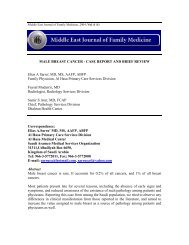Patient Expectations of General Practitioner Care - Middle East ...
Patient Expectations of General Practitioner Care - Middle East ...
Patient Expectations of General Practitioner Care - Middle East ...
You also want an ePaper? Increase the reach of your titles
YUMPU automatically turns print PDFs into web optimized ePapers that Google loves.
<strong>Middle</strong> <strong>East</strong> Journal <strong>of</strong> Family Medicine, 2005; Vol. 3 (3)• to consider the role <strong>of</strong> the general practitioner inhealth promotion,• to obtain patient views about other servicesprovided in health centers and how these servicescan be improved.METHODSQualitative and quantitative methods were used.Initially focus group discussion took place, which wasfollowed by questionnaire survey.Focus GroupFocus group discussion took place in one <strong>of</strong> the urbanhealth centers in Abu Dhabi serving the population <strong>of</strong>35,000 people. An advertisement was put on the noticeboard and patients were invited to register their namesat the reception desk. Out <strong>of</strong> 25 registered patients ahomogenous group <strong>of</strong> 12 patients was selected. 8patients confirmed participation and 4 did not attend onaccount <strong>of</strong> other commitments. The proceedings wereaudio recorded and subsequently analysed to extractrelevant themes and issues.Questionnaire SurveyThe second part <strong>of</strong> the survey involved a questionnairesurvey <strong>of</strong> 25 patients randomly selected according totheir order <strong>of</strong> attendance at the reception desk in thesame primary health centre where the focus groupdiscussion was conducted. The target population was 25years and above and included both nationals as well asexpatriates. The instrument <strong>of</strong> study was aquestionnaire which was developed after literaturesurvey and focus group discussion. Out <strong>of</strong> 25 patientswho agreed to participate only twelve agreed tocontinue upon receiving the detailed questionnaire.The questionnaire was in three parts; the first covereddemographic details, the second inquired aboutexpectations <strong>of</strong> general practitioner attitudes and thefinal part about expectation <strong>of</strong> other services providedby the health centre. The questionnaire consisted <strong>of</strong> 23items both categorical and non-categorical based onseven sub-scales (factors). Basic demographicinformation was asked from the patients using ordinalscale.<strong>Patient</strong> expectations <strong>of</strong> general practitioner attitude wasassessed by using 5 sub - scales (factors) comprising <strong>of</strong>14 items. These subscales were:• Doctor patient relationship.• Communication.• Concern about patients' social and psychologicalproblems.• <strong>Patient</strong> involvement in decision making.• Health promotion.<strong>Patient</strong>s were asked to rate their responses on a 5 pointlikert scale. At the end information about barriers togetting good medical care were sought in two openended question.Data AnalysisThis was done by doing the frequency analysis andfactor analysis <strong>of</strong> the data collected from respondents.Mean score <strong>of</strong> each item was calculated and from thismean score each factor was determinedRESULTSFocus groupA wide range <strong>of</strong> topics regarding patient expectationswere discussed and valuable insight was gained aboutpatient perceptions and experience <strong>of</strong> generalpractitioner care.Doctor patient relationshipAll participants agreed that good doctor patientrelationship is very important for the outcome <strong>of</strong>consultations. It was a general view that attentivelistening and a caring attitude is very important fordeveloping good doctor patient relationship. All theparticipants agreed that they were enjoying good doctorpatient relationship and were satisfied with the quality<strong>of</strong> the consultation.Qualities <strong>of</strong> a general practitionerParticipants unanimously agreed that the mostimportant qualities <strong>of</strong> a general practitioner are attentivelistening, understanding and compassion. Theyexpected their general practitioners to possess thesequalities. Knowledge and the skills though importantfor being a good general practitioner were rated second.Involvement decision makingMost <strong>of</strong> the participants expected that patients shouldbe actively involved in management <strong>of</strong> their problemsand in case there is conflict <strong>of</strong> the opinion, the doctorshould use his skills to find some common ground.They were also <strong>of</strong> the opinion that patients should bekept fully informed about their illness, drugs prescribedand their side effects.Health promotion and educationAll the participants agreed that health education wasvery important for health maintenance. They expectedthe primary health teams to be actively involved in thehealth education <strong>of</strong> their patients.Other servicesParticipants showed overall satisfaction with the otherservices provided in the health centre. However, theyshowed dissatisfaction with the referral system, servicecharges and waiting time. They also wanted to receivevaccination for infectious diseases before proceeding onvacations to their native countries. .Results <strong>of</strong> questionnaire surveyDoctor patient relationshipThis sub scale measures the importance <strong>of</strong> doctorpatient relationship for the successful outcome <strong>of</strong> theconsultation and obtained a mean score <strong>of</strong> 4.2.Frequency analysis <strong>of</strong> various items in this sub-scale7


